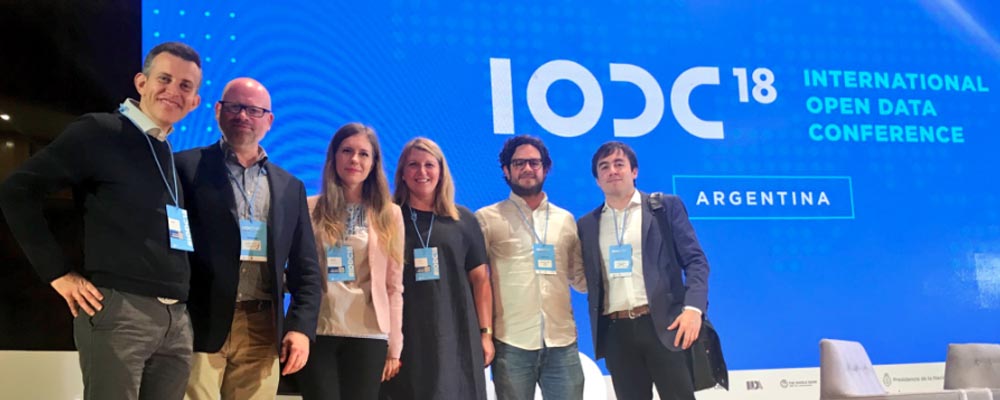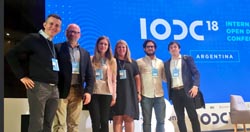
David Riveiros is a OYW Peace Ambassador from Paraguay and the Founder and Executive Director of ReAccion Paraguay, a grassroots organisation that promotes transparency in the education sector.
Transparency is the new political currency and it’s being cynically exploited by those in power to pay lip service to fighting corruption while maintaining the impunity elected representatives who need to be brought to justice.
We are moving towards a less corrupt world. We use technology for open data platforms, portals, and apps to monitor government and make public procurement transparent. Governments have co-operated with these innovations mostly to win the applause of international institutions who praise them on the global stage. But politicians know very well that transparency means nothing without accountability.
Corruption is rampant across Latin America. In my home country of Paraguay we have undergone a constitutional and political crisis over the failure to address palpable corruption. In Brazil, the Lava Jato (Operation Car Wash) investigation continues to expose venality at the highest levels of government. In Argentina, a police probe into money-laundering and corruption has seen charges levelled against a former President and Vice-President. Either due to their Right to Information Laws or the tech innovations they have put to the service of transparency and openness, these countries pride themselves on their open government credentials.
Granted, greater transparency might initially lead to higher number of corruption scandals brought to light. Nevertheless, it is when the open secret of corruption becomes a public truth, but impunity remains unchecked, that we see how transparency becomes another buzzword. Thus, transparency reforms become a political currency with no other value but a façade of accountability.
However, as a young anticorruption activist, I don’t despair because I know that the younger generation, around the world, has zero tolerance of corruption. And because I know from direct experience that we can turn this culture around.
I started fighting corruption when I was 17-years-old. I was President of the Student Council of the second largest high school in Paraguay, with around 4,000 students. Books were not getting to students and infrastructure was not being built. We realised that there was politically-influenced corruption in the school and we investigated the board of directors and uncovered irregularities.
The Ministry of Education ignored our evidence, and so, after months of lobbying, we radicalised our rhetoric and began strike action, boycotting classes for over three weeks during final examinations. It became news and I was demonised in the media, accused of being a drug addict and a vandal. I was threatened with jail. But through coordinated non-violent action, we forced the Minister of Education to agree to an audit of the school.
Alas, that audit never materialized. But my friends and I realized that fighting corruption would require something beyond our individualities. Hence, we felt motivated to create what has become an influential youth anti-corruption NGO, which today is known as reAcción Paraguay.
Five years on, our staff’s average age is still only 21. Our volunteers are as young as 15. We don’t have senior members or a board of advisors. Yet we have grown to the level where we have enough resources to rent an office, to buy much needed tools such as laptops, and to host training workshops. For the first 5 years, we would meet in public squares, shopping malls, and friends houses to coordinate projects with micro-grants we won from international competitions. Recently we have contributed to research at national and international level. We have been a case study for a World Bank publication on human rights and the use of open government data to monitor the investment of public funds. We have been published by Transparency International and the United Nations.
Yet we don’t want to be just another fig leaf that gives the impression of progress, while corruption continues to fester.
At events hosted by organisations such as the IMF and the World Economic Forum, where I have had the opportunity to be a panelist, I always guard against patronising discussions where one is included as a token young leader, the sort of people who listen and reply to what one says as if they were thinking: “these kids from Paraguay, aren’t they passionate?” I have tried again and again to show delegates that we know the labyrinthine policy processes that plague developing countries and that we are able to articulate solutions in technical terms so that policymakers at a high level understand what we are doing. Youth can be better allies in the fight against corruption if we are considered as partners, not simply as the “youth element” of development projects.
This is why I’ve always felt that reAcción must not fail. As a youth-led organisation made up of idealistic and committed youngsters, we were confronted with the stereotype—held by many adults and policymakers—that young people are passionate and committed in the short term but that you never get long term policy influence from them. That, at most, youth will be present at demonstrations and will rebel against the government for the amount of time it takes them to realise what life is really about. In other words, they expect we will eventually succumb to the status quo. If we failed as a completely youth-led NGO, that would confirm this belief - and so failure has never been an option for us.
Young people desperately want to fight corruption. Yet we are always told: ‘That’s not the way you should approach it’. Had we listened to that advice; had we done things “the way things ought to be done”, we would have never been innovative. Nothing would have changed.
It’s precisely because reAcción is made up of wholly of young people that we have been so innovative. We have not done simply what was expected of us by policy makers and even young professionals. We have paid a price for that by making many mistakes. But new mistakes are inherently valuable; they are a form of innovation.
We need that new approach now.
In the last two decades anti-corruption has become this huge thing and transparency is depicted as a form of medicine for all the institutional problems that developing countries have.
Transparency reforms and accountability have started to become fashionable buzzwords in political rhetoric. But the substance behind those promises decreases almost proportionately to the amount of times you hear them. We assume there is progress when there is none.
Open government data is only of worth if it can be understood by citizens. It’s only when governments react to citizen demands for accountability by curtailing corruption and improving service delivery that open government data becomes meaningful. Making data transparent is itself only about 25 per cent of the process - even if the Open Government Partnership applauds such things as if they are big steps, conveying global kudos. We cannot become sycophantic towards what amounts only to the beginning of the reform process.
Part of the problem—and indeed, the challenge—is that the institutions and organisations that make up civil society are compromised to an extent in terms of holding governments to account. As co-creators of many of the transparency tools in the reform process, it becomes increasingly complicated for civil society organisations to criticize and pressure governments when impunity is not checked. Hence the conflict: to represent and defend the interests of the citizens they represent without alienating the incipient relationship with government bureaucracies. In that conflict, I would claim governments get the better deal since they are legitimized by civil society’s participation, even in the face of impunity.
That’s a dangerous state of affairs.
Civil society must mobilise the grassroots so that citizens in general understand the importance and complete meaning transparency. Data openness from government is a first step. However, if the corruption that citizens have always known as open secrets do not become public truths that end in accountability, transparency is but a political currency that buys legitimacy to governments.
Public truths that we cannot challenge even with all the evidence available will further alienate citizens from believing in democracy and trusting institutions.
To truly talk about transparency, we must first necessarily reach accountability, or citizens will feel that any efforts to challenge corruption are useless.

